- Home
- David Lubar
Sophomores and Other Oxymorons Page 16
Sophomores and Other Oxymorons Read online
Page 16
November 19
I nearly had to make up some fake Latin the other day, Sean. Here’s the crazy thing. If you toss out some Latin-sounding stuff to try to appear smart, amazingly enough, there’s a word for that. Cacozelia. I love that, because it sounds like caca, which is slang for crap. There are a couple other words that are related to cacozelia. Here’s the best one. If you use a word that sounds right but isn’t, that’s a malapropism. Like if someone said that self-rule was metonymy. As much as I’d rather have anyone else for an English teacher, some of the words Mrs. Gilroy introduced us to are, as they say in Latin, retortocerebemic. Guess what? I made that up. You’ve been cacozeliad. Looks like there’s more than one Hudson who can deliver the caca, you little diaper stuffer.
Thursday, when I saw they were holding auditions for the play, I wandered down to the auditorium to watch. I was ineligible to try out. That was okay. I had no interest in acting. I just wanted to check things out.
When the director spotted me, a look of horror rippled across his face. I guess he hadn’t forgotten my audition from last year. Then the horror was replaced with relief. He pointed at me and said, “Stage crew. Right?”
“Yup. But I might not be able to do it this year.”
“That’s a shame. What’s keeping you away?”
“Grades,” I said.
“Well, if you manage to fix that, you’re welcome at any time.”
“Thanks. What’s the play this year?”
“We’re doing a musical version of Goodnight Moon,” he said.
“That’s a picture book.” I tried to imagine it being brought to the stage.
“Every object in the room has a story to tell. And a song in its heart.” His grin was followed by a sigh.
“What’s wrong?”
“I wanted The Giving Tree Opera, but it was too expensive. The new school board is killing us with their cuts.”
“Hey, maybe next year . . .” I figured I should let him get back to work. I was about to join the stage crew members who’d come to watch the auditions when Kyle walked into the auditorium and headed in their direction. Great. He probably wanted to get on stage crew to be near Kelly, who was likely to get a role in the play. Whatever his motivation, if he was going to be part of the crew, I definitely didn’t want to get involved.
• • •
I heard a car pull into the driveway. “I’ll bet that’s Bobby.” I got up from the couch, where Dad and I had been camping, watching the college games.
Dad nodded. “Definitely him. He told me he’d rescued a ’68 Plymouth Satellite from the junkyard.”
I opened the front door. Yeah. Bobby was there, driving an enormous old muscle car I now knew was a Plymouth. He got out and headed for the trunk.
“Need a hand?” I shouted.
“Sure. Grab a bag.”
A woman got out of the passenger side. She was tall and curvy. Nearly as tall as Bobby. I feel weird saying this about my future sister-in-law, and I’m only going to say it once, but she had a great body. Her skin was dark. Her hair was abundant.
“You must be Scott,” she said.
“Somebody has to be,” I said.
Bobby gave me a weird look. He doesn’t always get me. But Amala laughed. “And you were chosen for the role,” she said.
“Right. I beat out all the weaker contenders.” I grabbed a suitcase from the trunk.
Mom and Dad joined us.
“Welcome to our home,” Mom said. She held out her arms.
They hugged.
Dad held out his hand. Amala took it. I realized I hadn’t offered her either a handshake or a hug. I hoped she didn’t think I was a jerk. Though Bobby had probably already told her every horrifying and embarrassing story from my infancy and childhood.
Mom swept Amala off for an in-depth tour of Sean World. Dad and I helped Bobby carry their stuff up stairs.
“Is she . . .” I pointed downstairs in the general direction of Amala, Then, I pointed to Bobby’s room. “. . . here?”
“Unless you want me to move in with you,” Bobby said. “We still have the old bunk bed stored in the basement.”
“No way I’m ever sleeping in that thing again.” I spent two years waiting for the top mattress to crash down and smother me into the deep sleep of death, while Bobby lay above, oblivious, sleeping the deep sleep of sleep. Maybe that’s why I liked reading Poe so much.
“Don’t worry,” Bobby said. “You won’t have to.”
“Your mom and I had a long discussion about this,” Dad told me.
“Mom’s cool,” Bobby said.
“I wouldn’t go that far,” Dad said. “But she’s . . .” He looked at me for the right word.
“Tolerant?”
“Yeah.” Dad put a hand on my shoulder. “But don’t you get any ideas.”
“No ideas,” I said. Dreams, yes; ideas, no.
November 23
Sean, Bobby’s fiancée is really smart. She has a degree in public relations from Kent State. I’m not sure where she’s from. I mean, she grew up in south Jersey, but I can’t figure out her ethnicity. If I had to guess, I’d say she’s from south of the equator. But I guess I don’t have to guess. She’ll tell us. Or Bobby will. Or they won’t. We’d learned in history about how at one time in parts of America, it was illegal to marry someone from another race. I can’t imagine that. Talk about voting for stupid. . . .
Amala fit right in at Thanksgiving dinner. And she preferred thighs to drumsticks, so I didn’t have to exercise altruism. Mom ground up a tiny piece of turkey for Sean, to go with his sweet potatoes and beans. She should have ground some up for Aunt Zelda, too. At least my messiest aunt and my messiest brother were seated near each other, so there was only one zone of repulsion for the eye to avoid.
Lee called me after dinner. “Don’t make any plans for tomorrow,” she said.
“I was going to work on my novel,” I said.
“For NaNoWriMo?” she asked.
“Yeah.”
“That’s highly ambitious. How much do you have left?” she asked.
“Some . . .”
This was greeted with silence.
“A lot . . . ,” I said.
More silence.
“Pretty much all of it.”
“Do you even have a title?” she asked.
“I figured I’d save that for last.”
“First chapter?”
“Nope.”
“First paragraph?”
“Still working on it.”
“Opening line?”
“Soon. I’ve come pretty close.”
“You know the month is nearly over,” she said.
“Yeah. I’m not sure how that happened.”
“I give you my permission to fail,” she said.
“I don’t need your permission,” I said.
“True. That’s been emphatically demonstrated recently. But I’m still giving it to you. See you tomorrow. We’ll pick you up around 12:30.”
“We?”
“Dad and me.”
“Yay. See you then.”
“Wear comfortable clothing,” she said.
“That’s all I have.”
November 27
There’s a lot of satisfaction in writing short things, Sean.
TWENTY-THREE
Lee wouldn’t tell me where we were going. All her dad would say was that this was their traditional day-after-Thanksgiving outing.
“Does it involve a human sacrifice?” I asked.
“Relax, Scott,” he said. “If I were planning to kill you, I would have left Lee at home.”
“Dad!” Lee said. “Not funny.”
“Sure it is. Right, Scott?”
“Yeah, hilarious,” I said.
We
headed up the Northeast Extension of the Turnpike to the next exit, then drove along a road off 209 that wound northwest, skirting a stretch of state forest. Several miles later, we pulled into a parking lot in a large clearing by a four- or five-story metal building that turned out to be an indoor climbing gym.
“I thought you weren’t big on sports,” I said as we walked inside.
“This is not a sport,” Lee said. “It’s an adventure.”
We took turns climbing far higher than anybody needed to go. It was actually fun. Though the thing I enjoyed most was watching Lee climb. I tried not to watch her too closely, or with too much admiration for her form, since I was sure her dad would be able to sense any heat waves emanating from me.
He held the rope when I climbed. I had a feeling he liked knowing my life was in his hands. Lee and I held his rope together.
“How fond are you of him?” I asked as he neared the top of the climb, and reached the spot where we’d all slipped at least once.
“You’re as bad as he is,” she said. But she said it with a grin.
“Hardly.”
“Fond or not, I think my mom would be sad if we returned without him,” she said.
“We can’t have that,” I said. “Let’s not let him fall.”
“Agreed. Let’s not.”
• • •
Mom and Amala had gone shopping. Along with almost every other person in the country. Dad was in the garage. I said hi to him, then headed up to Bobby’s room.
“Where’d you go?” he asked. He was sitting on the edge of his bed, playing his guitar.
“Lee’s dad took us rock climbing.”
“Sounds risky,” Bobby said.
“Girls’ dads are scary,” I said.
“Tell me about it. Amala’s dad is like six foot eight.”
“Seriously?”
“Close. He played football in college.”
“What’s he do now?”
“Mostly, he struggles to keep from killing me. In his spare time, he’s a foreman at a company that makes caskets.”
“Is that a joke?” I asked.
“I wish.”
“Well, if he kills you, at least he’ll probably feel guilty enough to make sure you’re buried in style.” I sat on his bed next to him. “It’s nice having you here.”
“It’s nice being here.”
• • •
Sunday was the last day of the month. And the end of NaNo-WriMo. Maybe next year I’d try again. For now, it was sort of a relief to accept that I’d failed.
Bobby and Amala were planning to head out after dinner. While Bobby and Dad were in the driveway playing around with something under the hood of the Plymouth, Amala poked her head into my room.
“Thank you for being so welcoming,” she said.
“You’re pretty easy to welcome,” I said. I got up from my desk and walked over to her. “I like you. You’re good for Bobby.”
“How so?” Amala said.
“He’s settled down. He used to be a bit . . .” I didn’t want to say anything bad about him. But I wanted her to know he wasn’t a choirboy.
“Wild?” she guessed.
“Yeah.”
“So was I,” she said. “So were we,” she added.
“You and Bobby?”
“We go back a ways. We crossed paths a lot.”
“Really?”
She smiled. “Do you remember last year, when Bobby was in Ohio?”
“Sure.” I’d never forget the day he took off.
“That’s where I was,” she said.
“At college?”
“Right. He came out one time before that, too. We were wild. But we got all of that wild out of our systems. I think we calmed each other down. You know what it all comes down to?”
“What?”
“I love him. Totally. With all my heart. With all my soul. With all my being.”
“Anaphora,” I said.
She stared at me.
“Sorry. Bad habit. I’ve been sort of immersed in figures of speech.”
She laughed and gave me a hug. “I love you, too, my little brother.” She let go and stepped back. “Bobby chose well when it came to siblings.”
“So did I.”
As if on cue, Sean let out a wail.
“At least, the first time,” I said.
TWENTY-FOUR
The gloom of our adolescent moods contrasted jarringly with the early December mid-afternoon sunlight that dappled the ledges of the waist-high bookshelves in the antiquated ninth-period English literature classroom (for it is in Zenger High School where our story begins), when the overly stern educator Mrs. Gilroy hefted a leather-bound tome and intoned an overly emotive rendition of the opening narrative.
“It was a dark and stormy night; the rain fell in torrents—except at occasional intervals, when it was checked by a violent gust of wind which swept up the streets (for it is in London that our scene lies), rattling along the housetops, and fiercely agitating the scanty flame of the lamps that struggled against the darkness.”
“That’s awful,” I whispered to Lee. I hoped this wasn’t an introduction to our next reading assignment.
“Impressions? Reactions?” Mrs. Gilroy asked.
Hands went up. I kept mine down. Teachers hate it when you criticize the writing they bring into the classroom.
After listening to various responses, ranging from “highly poetic” to “literary,” Mrs. Gilroy said, “Most people with an ear for prose feel this is an awful sentence.”
I flashed Lee a grin. Mrs. Gilroy flashed me a glare, then continued talking. “This deathless prose is the opening sentence of a novel by Edward Bulwer-Lytton.” She paused to write the man’s name on the board. “It has inspired an annual contest that encourages people to write the worst possible opening sentence. I encourage all of you to give that exercise a try.”
“Why would you want us to write something bad?” Julia asked.
“Would anyone like to venture a guess?” Mrs. Gilroy looked around the room. Nobody was willing to take a shot.
I was pretty sure I knew the answer, but I didn’t raise my hand.
“To write something really bad, you have to know what makes something really good,” Mrs. Gilroy said, echoing my thoughts. She looked right at me as she added, “That’s a lot harder than it sounds.”
That was when I decided I was going to win the contest.
• • •
Kyle’s father came over to the house again that evening, with some papers for Dad to read through. He brought Kyle, who didn’t look any more thrilled to see me than I probably looked to see him.
“Hey, Scott,” Mr. Bartock said. “We’re just running errands. You guys can hang out for a minute while I give these to your dad. Is he in the garage?”
“Yeah,” I said.
Mr. Bartock scooted down the hall. Kyle and I stared at each other.
“Our dads seem to think we should get along,” I said.
“That’s one more reason not to,” Kyle said.
“You sound like Lee.”
“Who?”
“You know.”
“Oh, yeah. Her. The guys on the team call her Weirdly.”
“You’ve called her worse,” I said. “She’s my friend.”
“You deserve each other.”
“Why are you so mean?” I asked.
“Why are you so stuck up?”
The approach of our fathers cut the discussion off before we could reach common ground or critical mass.
As Mr. Bartock was leaving, he shook Dad’s hand and said, “It’s a relief to be back on my feet. It’s been a rough year.”
“This will be a good start for both of us,” Dad said.
“Rough year?” I as
ked after he’d left.
“He had some real bad luck,” Dad said. “Not his fault. Two of his businesses got sideswiped by the economy.”
“That’s brutal,” I said.
“And it’s scary,” Dad said. “You work hard. You work smart. And then bad luck comes along.”
“So what do you do?” I asked.
“Keep working,” he said.
I heard Mr. Bartock’s car starting up. I knew there’d been a lot of tension at Kyle’s house last year. I realized we hadn’t hung out there as much freshman year as we had through elementary and middle school. Last year, we’d usually gone over to our friend Mitch’s house, until he’d dumped us. Or Patrick’s. Until he’d moved.
• • •
I guess Mr. Bartock really wanted Kyle to learn about business, or rekindle old friendships, or something, because he brought him again the next evening, when he came to give Dad some good news.
“I know it’s been a long wait. But we’re finally in good shape,” Mr. Bartock said. “I wanted to tell you in person. I have a deal with Sherman Construction for the Kingston units I need to sell. The guy’s a jerk, but he always seems to have lots of cash on hand.”
“I’m just glad we’re almost there,” Dad said.
“I’ll be signing papers with him next week,” Mr. Bartock said. “And we can sign ours as soon as he hands me that check.”
“Great,” Dad said.
They shook hands.
“Really great,” I said, giving Kyle my biggest grin. He might still look for some way to hurt me, but at least soon he’d no longer be a threat to Dad.
December 8
Sean, I spent all week trying to write a bad opening for the Bulwer-Lytton contest. I totally failed. I suck at being bad. Ironically, that’s not good.
TWENTY-FIVE
I’d managed to convince my parents that they needed to get out of the house once in a while. They were just going down the road for pizza. But it was a start. What I really wanted them to do was go out for New Year’s, which was two and a half weeks away. I was hoping they’d let Lee come over, too.
“We’ll be back as soon as possible,” Mom said.
“Or sooner,” Dad said.
“Relax. I’ve got this,” I said, trying to sound more confident than I felt. Sean seemed just fine in his playpen.

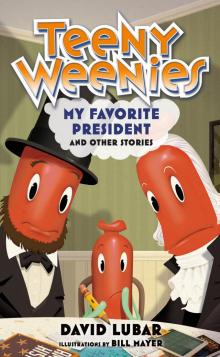 Teeny Weenies: My Favorite President
Teeny Weenies: My Favorite President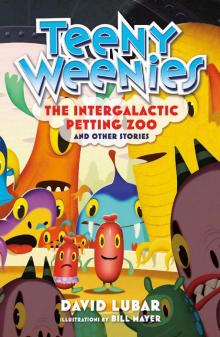 Teeny Weenies: The Intergalactic Petting Zoo
Teeny Weenies: The Intergalactic Petting Zoo Teeny Weenies: The Eighth Octopus
Teeny Weenies: The Eighth Octopus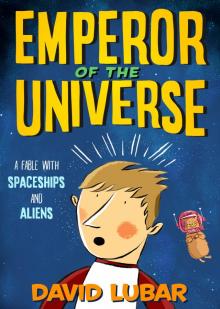 Emperor of the Universe
Emperor of the Universe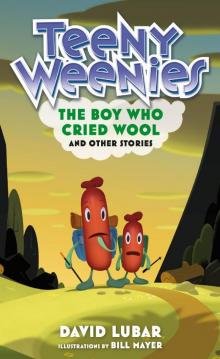 Teeny Weenies: The Boy Who Cried Wool
Teeny Weenies: The Boy Who Cried Wool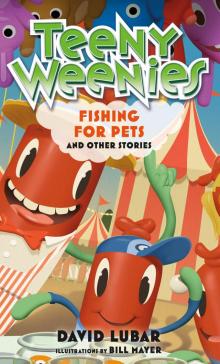 Teeny Weenies: Fishing for Pets
Teeny Weenies: Fishing for Pets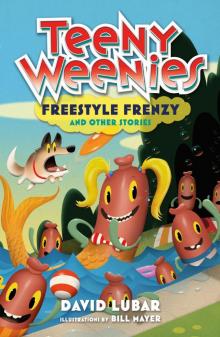 Teeny Weenies: Freestyle Frenzy
Teeny Weenies: Freestyle Frenzy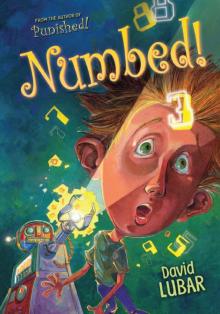 Numbed!
Numbed!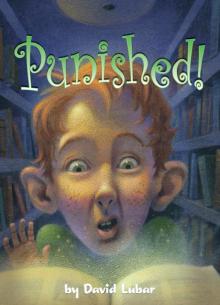 Punished!
Punished!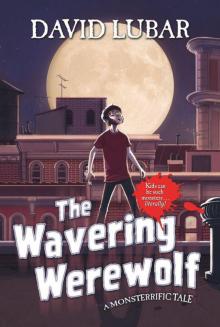 The Wavering Werewolf: A Monsterrific Tale (Monsterrific Tales)
The Wavering Werewolf: A Monsterrific Tale (Monsterrific Tales)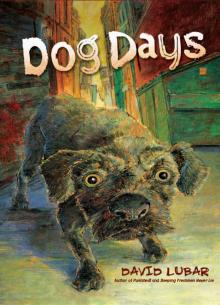 Dog Days
Dog Days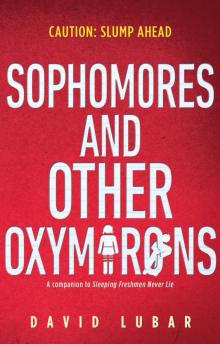 Sophomores and Other Oxymorons
Sophomores and Other Oxymorons The Psychozone
The Psychozone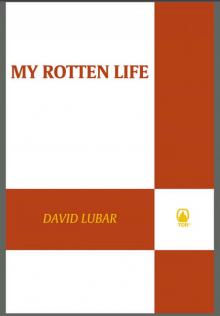 My Rotten Life
My Rotten Life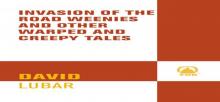 Invasion of the Road Weenies
Invasion of the Road Weenies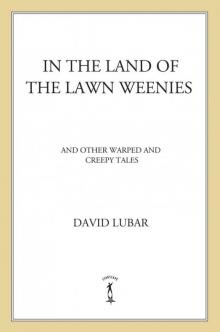 In the Land of the Lawn Weenies
In the Land of the Lawn Weenies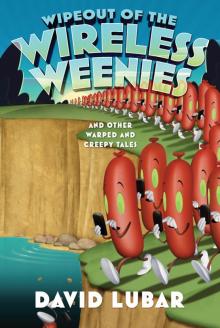 Wipeout of the Wireless Weenies
Wipeout of the Wireless Weenies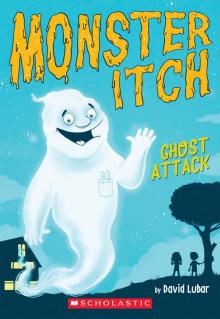 Ghost Attack
Ghost Attack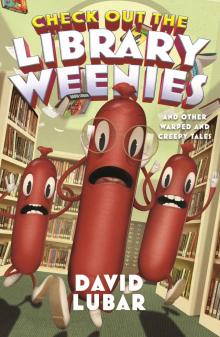 Check Out the Library Weenies
Check Out the Library Weenies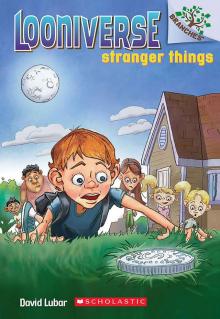 Looniverse #1: Stranger Things (A Branches Book)
Looniverse #1: Stranger Things (A Branches Book)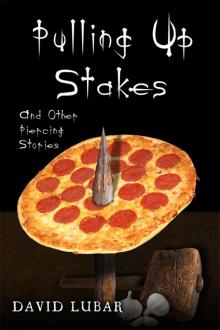 Pulling up Stakes and Other Piercing Stories
Pulling up Stakes and Other Piercing Stories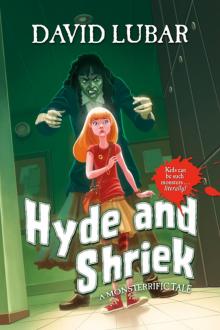 Hyde and Shriek
Hyde and Shriek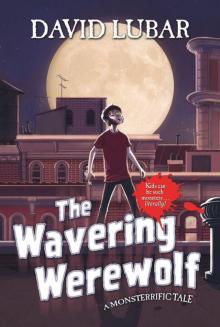 The Wavering Werewolf
The Wavering Werewolf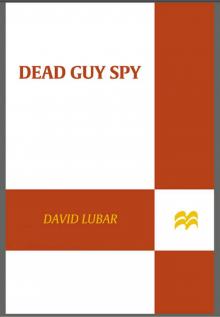 Dead Guy Spy
Dead Guy Spy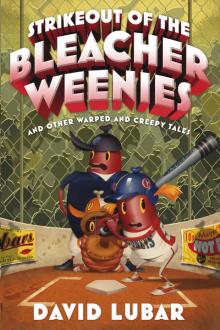 Strikeout of the Bleacher Weenies
Strikeout of the Bleacher Weenies The Big Stink
The Big Stink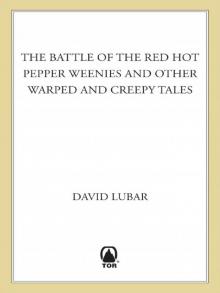 The Battle of the Red Hot Pepper Weenies
The Battle of the Red Hot Pepper Weenies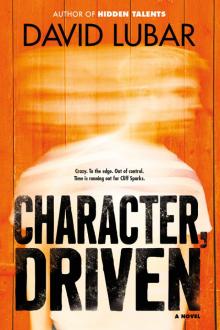 Character, Driven
Character, Driven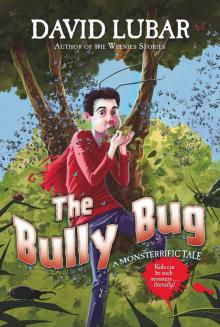 The Bully Bug
The Bully Bug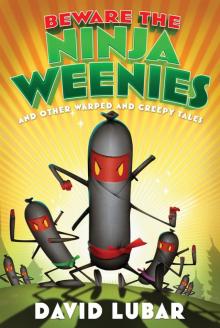 Beware the Ninja Weenies
Beware the Ninja Weenies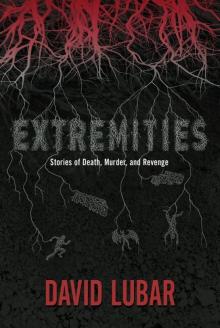 Extremities: Stories of Death, Murder, and Revenge
Extremities: Stories of Death, Murder, and Revenge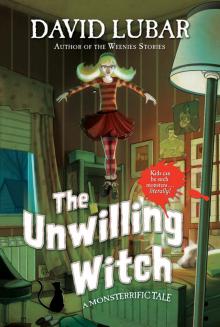 The Unwilling Witch
The Unwilling Witch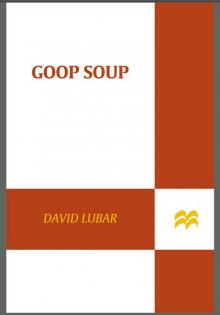 Goop Soup
Goop Soup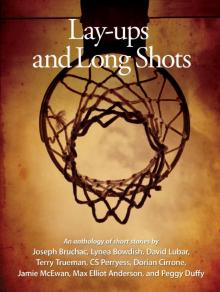 Lay-ups and Long Shots
Lay-ups and Long Shots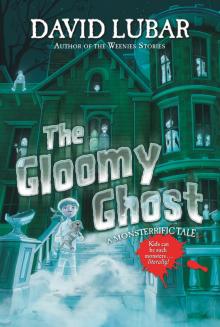 The Gloomy Ghost
The Gloomy Ghost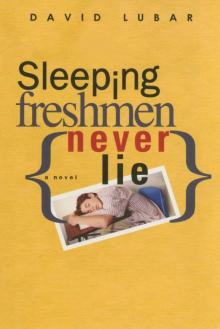 Sleeping Freshmen Never Lie
Sleeping Freshmen Never Lie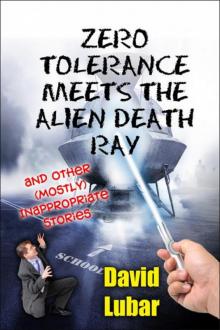 Zero Tolerance Meets the Alien Death Ray and Other (Mostly) Inappropriate Stories
Zero Tolerance Meets the Alien Death Ray and Other (Mostly) Inappropriate Stories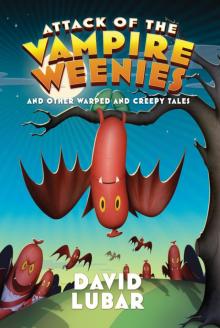 Attack of the Vampire Weenies
Attack of the Vampire Weenies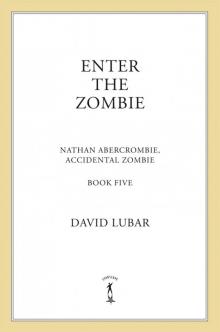 Enter the Zombie
Enter the Zombie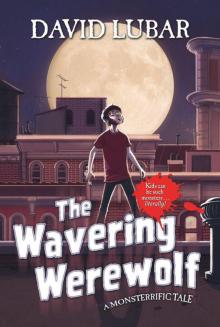 The Wavering Werewolf_A Monsterrific Tale
The Wavering Werewolf_A Monsterrific Tale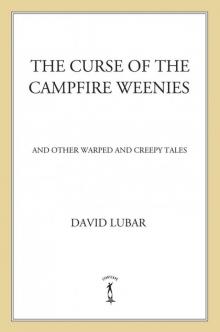 The Curse of the Campfire Weenies
The Curse of the Campfire Weenies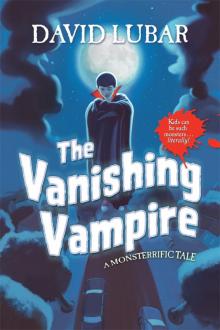 The Vanishing Vampire
The Vanishing Vampire